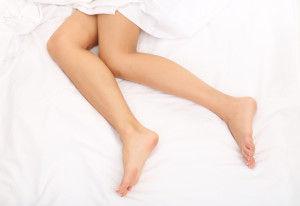 Restless legs syndrome (RLS) is a central nervous system movement disorder associated with sleep. Usually, there is an irresistible urge to move the legs, often accompanied by a crawling or a pins-and-needles sensation. Sufferers may also exhibit restlessness, like leg rubbing or tossing and turning in bed. It almost exclusively occurs at rest while lying or sitting, and is temporarily relieved by movement. During a sleep study, regular movement (like foot dorsi-flexion) may occur very frequently. Some sufferers demonstrate associated sleep disturbance, daytime fatigue, and involuntary, jerking limb movements during or prior to sleep.
Restless legs syndrome (RLS) is a central nervous system movement disorder associated with sleep. Usually, there is an irresistible urge to move the legs, often accompanied by a crawling or a pins-and-needles sensation. Sufferers may also exhibit restlessness, like leg rubbing or tossing and turning in bed. It almost exclusively occurs at rest while lying or sitting, and is temporarily relieved by movement. During a sleep study, regular movement (like foot dorsi-flexion) may occur very frequently. Some sufferers demonstrate associated sleep disturbance, daytime fatigue, and involuntary, jerking limb movements during or prior to sleep.
It is important that other causes of similar problems like iron deficiency, diabetes and nerve disease of the legs be excluded during diagnosis.
Since this is a central nervous system (CNS) disorder, agents affecting the CNS should be avoided to fully realize improvement: drugs like beta-blockers, and especially alcohol, caffeine, and nicotine.
Thought to be an issue of dopamine in the brain, medications for Parkinson’s disease, seizures, and muscle relaxation may be used.[1]
In Traditional Chinese Medicine (TCM), RLS represents an overall “Yin deficiency”. The body has both Yin and Yang in relative balances, and as we age, we deplete some Yin. Yin “anchors” Yang (action/movement) during the night; deficient Yin no longer controls Yang which then “rises up” at night, producing movement when there should be rest. Other factors in TCM (“Wind”, “Blood” and “Qi”) also cause or contribute to this problem.
Neurological Scalp Acupuncture robustly addresses RLS, and gains made should be long standing. Because RLS signifies Yin depletion, body acupuncture and especially Chinese Herbal Medicine help prevent recurrence.[2 3 4]
Neurological Conditions Testimonials
Learn more about Restless Leg Syndrome
X
These brief overviews of conditions represent distillations of basic and current medical reviews from the following sources:
[1] Conventional Medical Sources
“Harrison’s Principles of Internal Medicine: Volumes 1 and 2, 18th Edition”. Dan Longo Anthony Fauci, Dennis Kasper, Stephen Hauser, J. Jameson, Joseph Loscalzo. McGraw-Hill Professional; (July, 2011)
Medscape eMedicine Physician’s online resource. Various review articles:
Complex Regional Pain Syndromes Treatment & Management.
Anthony H Wheeler MD. Medscape Reference Chief Editor: Stephen A Beman, MD PhD MBA.
Essential Tremor
Deborah A Burke, MD Clinician, Sub-Investigator, Movement Disorder/Parkinson’s Disease Center, University of South Florida College of Medicine; Investigator, Physician, Roskamp Institute Memory Clinic
Bell Palsy
Danette C Taylor, DO, MS Clinical Assistant Professor, Department of Neurology and Ophthalmology, Michigan State University College of Osteopathic Medicine; Senior Staff Neurologist, Henry Ford Health Systems
Meniere Disease (Idiopathic Endolymphatic Hydrops)
John C Li, MD Private Practice in Otology and Neurology; Medical Director, Balance Center
Restless Legs Syndrome
Ali M Bozorg, MD Assistant Professor, Comprehensive Epilepsy Program, Departments of Neurology and Neurosurgery, University of South Florida College of Medicine
Postherpetic Neuralgia
W Alvin McElveen, MD Director, Stroke Unit, Lakewood Ranch Medical Center; Neurologist, Manatee Memorial Hospital
Sleep disorders
Roy H Lubit, MD, PhD Assistant Clinical Professor, Mount Sinai School of Medicine; Clinical Faculty, Department of Child Psychiatry, New York University School of Medicine; Private Practice
Tinnitus
Aaron G Benson, MD Director, Ohio Hearing and Balance Institute, Maumee, Ohio; Consulting Staff, Toledo Ear, Nose and Throat, Inc
Multiple Sclerosis
Christopher Luzzio, MD Clinical Assistant Professor, Department of Neurology, University of Wisconsin at Madison School of Medicine and Public Health
Parkinson Disease
Robert A Hauser, MD, MBA Professor of Neurology, Molecular Pharmacology and Physiology, Director, USF Parkinson’s Disease and Movement Disorders Center, National Parkinson Foundation Center of Excellence, Byrd Institute, Clinical Chair, Signature Interdisciplinary Program in Neuroscience, University of South Florida College of Medicine
Tourette Syndrome and Tic Disorders
William C Robertson Jr, MD Professor, Departments of Neurology, Pediatrics, and Family Practice, Clinical Title Series, University of Kentucky College of Medicine
Post Concussive Syndrome
Roy H Lubit, MD, PhD Assistant Clinical Professor, Mount Sinai School of Medicine; Clinical Faculty, Department of Child Psychiatry, New York University School of Medicine; Private Practice
Traumatic Brain Injury
Segun T Dawodu, MD, JD, MBA, LLM, FAAPMR, FAANEM Associate Professor of Rehabilitation Medicine and Interventional Pain Medicine, Albany Medical College
Dizziness, Vertigo, Imbalance
Hesham M Samy, MD, PhD Head of Hearing and Balance Unit, Otolaryngology Department, Minia University, Egypt
CNS Causes of Vertigo
Marcelo B Antunes, MD Resident Physician, Department of Otorhinolaryngology-Head and Neck Surgery, University of Pennsylvania Health System
Communication Disorders
Renee S Melfi, MD Consulting Staff, Orthopaedic Associates of Central New York
[2], [3]
- “Acupuncture Energetics: A Clinical Approach for Physicians”. Joseph M. Helms. Medical Acupuncture Publishers; 1st Edition. (1995)
- “Foundations of Chinese Medicine: A Comprehensive Text for Acupuncturists and Herbalists”. Giovanni Maciocia. Churchill Livingstone; 2 Edition (July, 2005).
- “Diagnosis in Chinese Medicine: A Comprehensive Guide”. Giovanni Maciocia. Churchill Livingstone; 1st Edition (January, 2004).
Chinese Scalp Acupuncture”. Jason Ji-shun Hao, Linda Ling-zhi Hao and Honora Lee Wolfe. Blue Poppy Press; 1st Edition. (November, 2011)
